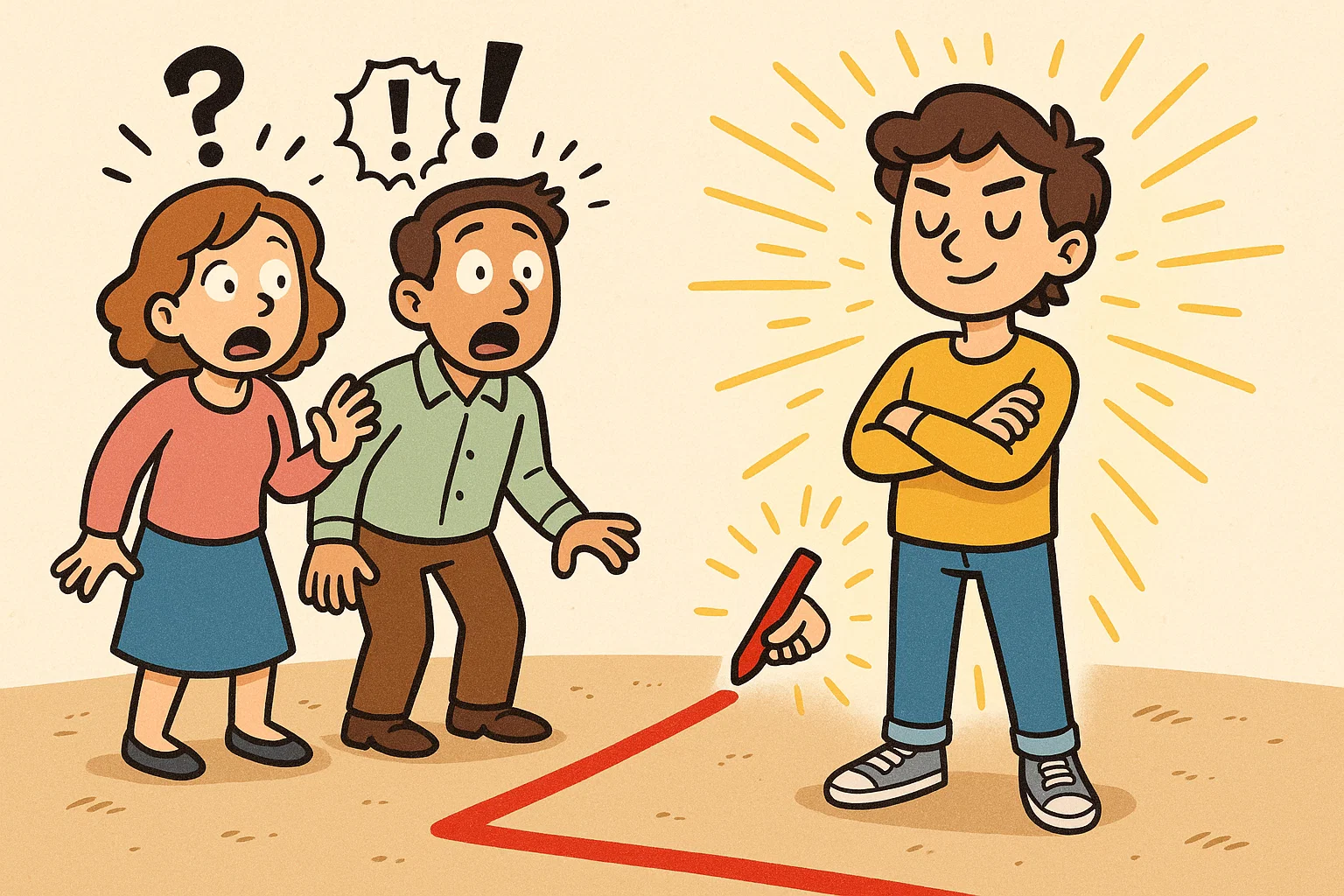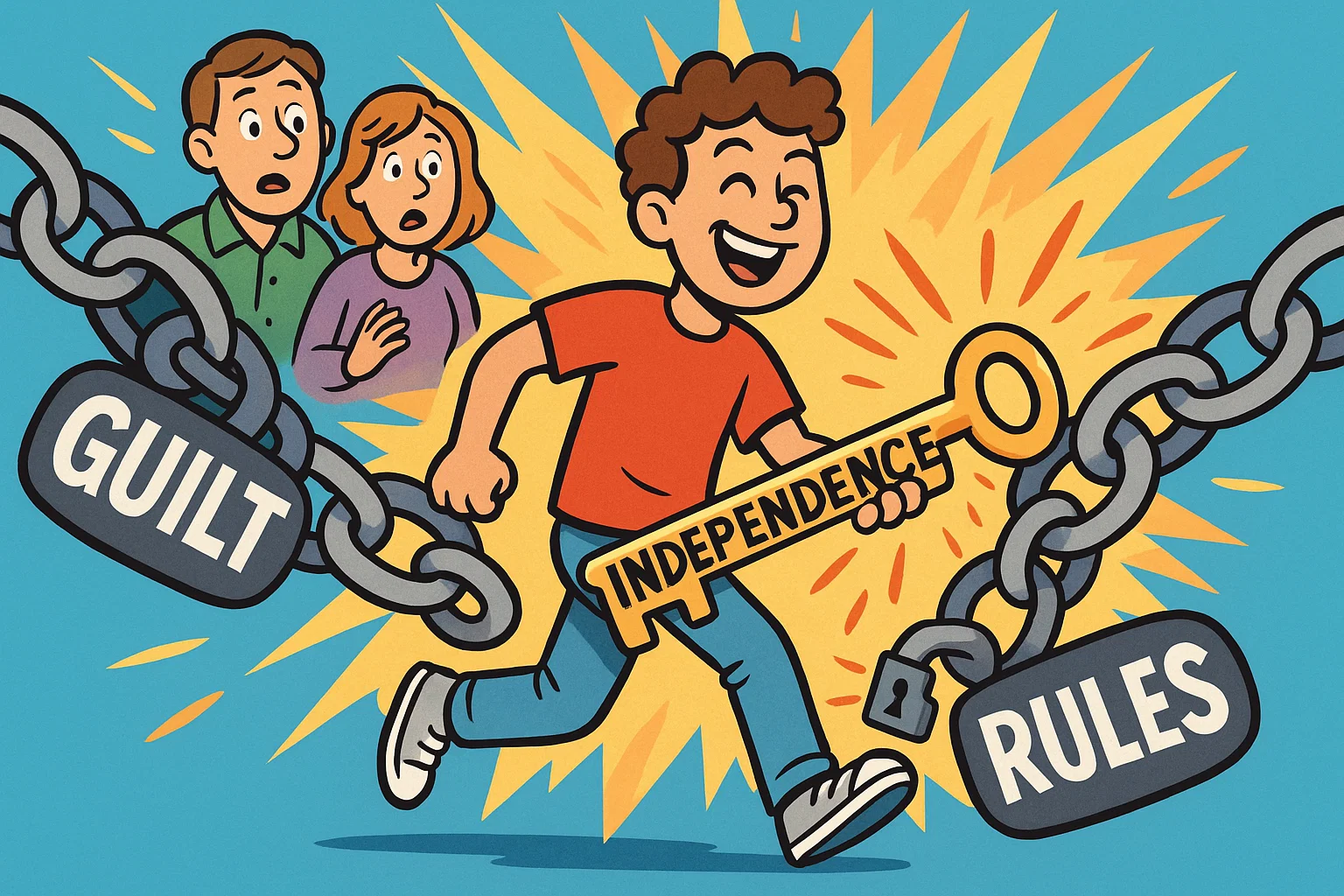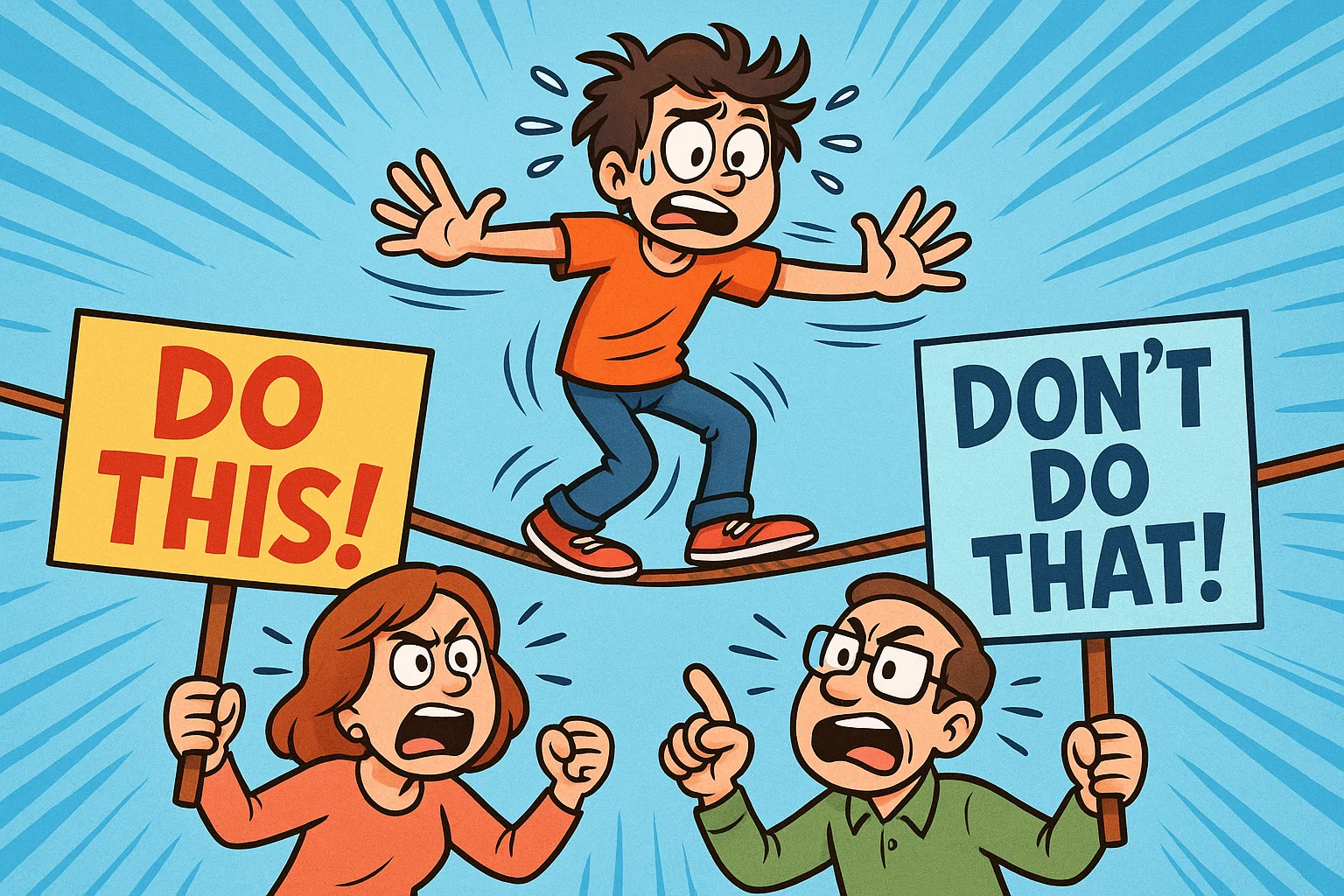Navigating the transition from being a child to a self-sufficient adult can be a bumpy road, especially when your parents continue to exert a strong influence over your life. While every parent-child relationship has its challenges, dealing with an overbearing parent can feel like a constant battle for your right to make your own decisions. This tricky dynamic is often rooted in a parent’s genuine, though sometimes misguided, love—but it can seriously affect your ability to thrive. You might find yourself feeling overwhelmed, experiencing a constant sense of guilt, or struggling with low self-esteem.
This guide is for anyone who has ever felt suffocated by a controlling parent—whether you’re an adult trying to set healthy boundaries or a young person still living at home. We’ll explore the signs of controlling parenting, the lasting psychological effects, and, most importantly, provide practical strategies to help you reclaim your sense of self and build healthier relationships. Learning to deal with controlling parents is a journey, but with the right tools and perspective, you can take back control of your life.
Signs of Controlling Parents

Recognizing the signs of controlling parents is the first step toward understanding your situation and working on setting healthier boundaries. Often, this behavior is subtle and can be mistaken for love or concern. A parent may believe they are simply looking out for you, but their actions can prevent you from developing autonomy and a strong sense of self.
Why parents become controlling
Understanding the root causes of overbearing behavior can provide important context and help you see that it’s often not about you. Many parents tend to be overly involved due to a complex mix of personal experiences and fears.
- Anxiety and fear: Some parents have deep-seated anxieties about their child’s safety and well-being. Their fear of mistakes or harm can drive a constant need to control the child’s environment and choices. This helicopter parenting style often stems from a fear of loss or a need to prevent their child from experiencing hardship, even if it’s a necessary part of growth.
- Past trauma or unfulfilled dreams: A controlling parent may have a history of trauma, such as a lack of control in their own childhood, which makes them feel a desperate need to control every aspect of their child’s life. Likewise, some parents try to live vicariously through their children, pushing them to achieve the dreams they couldn’t. This can be a form of conditional love, where their love and approval are contingent upon the child’s success in areas the parent values.
- Cultural or generational expectations: In some cultures, a parent’s role is seen as being more directive. A mother may believe it’s her duty to guide her child’s every move, from career choices to romantic partners. While cultural context matters, it’s crucial to differentiate between respectful guidance and overbearing parenting.
Common behaviors to notice
The signs of controlling parents can manifest in many ways, from small, everyday actions to major life decisions. Pay attention to these telltale signs that your parents’ caring has crossed the line into a need for control.
- Micromanaging and over-involvement: They constantly question your whereabouts, choices, and friends. They might call or text you multiple times a day, even if you’ve already told them you’re busy. This can leave you feeling like you have no personal space or privacy.
- Emotional manipulation: A controlling mother may use guilt-tripping to get her way. She might say things like, “After everything I’ve done for you, you can’t even do this for me?” or “You’re making me so worried, I can’t sleep.” This tactic makes you feel guilty for living your life independently and pressures you into doing what they want.
- Invasion of privacy: They might read your texts, go through your belongings, or monitor your social media accounts. This behavior shows a fundamental lack of trust and respect for your boundaries as an individual, even as an adult.
Emotional and mental impact on children
The constant presence of a controlling parent may have a significant impact on a child’s emotional and mental development. The effects can be long-lasting, influencing everything from their academic performance to their personal relationships.
- Stress and anxiety: The pressure to meet a controlling parent’s expectations can lead to chronic stress and anxiety. Children may live in a constant state of fear of making a mistake or disappointing their parents.
- Lack of independence: When a child’s every decision is made for them, they don’t get the chance to develop problem-solving skills or self-reliance. This can lead to a lack of confidence and difficulty functioning as a self-sufficient adult.
- Low self-esteem: A child constantly being criticized or undermined by a controlling parent will likely develop low self-esteem. They may internalize the message that they aren’t capable of making good choices on their own, which can persist well into adulthood.
When caring turns into controlling
It’s often difficult to distinguish between a parent’s genuine concern and their need to control. A caring parent will offer advice and support, but they will respect your ultimate decision. They will ask, “What do you think is best?” An overbearing parent will often say, “You should do this because I know what’s best for you.” The key difference lies in respect for autonomy. A caring parent helps you learn to fly; a controlling one keeps you in the nest.
Psychological Effects on Adult Children
The impact of an overbearing mom or controlling parents doesn’t magically disappear when you become an adult. Many adult children of overbearing parents continue to struggle with the psychological and emotional effects of their upbringing long after they’ve left home. These issues can affect your ability to make independent choices, form healthy relationships, and find happiness in your own life.
Self-esteem issues
Growing up with narcissistic parents or those who constantly criticize can severely damage your confidence. When your opinions are always invalidated and your choices are questioned, you start to believe that your judgment isn’t trustworthy. This leads to low self-esteem and a pervasive feeling of not being “good enough.” You may find yourself constantly seeking external validation and approval from others, repeating the cycle of needing someone else to tell you what to do. The effects of an overbearing mother can be particularly acute, as mothers often have a primary role in a child’s emotional development.
Difficulty making decisions
A childhood defined by a lack of personal choice can make it incredibly hard to make your own decisions as an adult. You might feel paralyzed by indecision, hesitant to commit to a career path, a partner, or even something as simple as what to have for dinner. This struggle stems from a lack of practice in making choices and a fear of negative consequences. You may constantly second-guess yourself, wondering what your parents know and if you’re about to make a huge mistake.
Relationship challenges
The patterns you learn in your family of origin often carry over into your romantic relationships and friendships. You might struggle with trust, either being overly suspicious of others or allowing people to cross your boundaries because you were never taught to set them.
How Parental Control Affects Adult Relationships
| Parental Behavior | Adult Relationship Challenge |
| Micromanagement | Difficulty trusting a partner to be an equal |
| Conditional Love | Seeking constant validation and approval from your partner |
| Emotional Manipulation | Tolerating guilt-tripping or controlling behavior from others |
| Lack of Boundaries | Struggling to set and maintain healthy boundaries with friends and partners |
Anxiety and guilt patterns
Many adult children of overbearing parents feel stuck in cycles of guilt. You may feel a sense of obligation to put your parents’ needs before your own, even if it comes at a significant cost to your well-being. This can lead to chronic anxiety and a feeling of being trapped. The fear of disappointing or hurting your parents is so ingrained that it can feel impossible to break away. This deep-seated guilt can follow you well into adulthood, making it hard to prioritize your own happiness.
Setting Boundaries With Controlling Parents

Setting healthy boundaries is one of the most crucial steps you can take to reclaim your autonomy and improve your relationship with your parents. It’s not about being disrespectful or uncaring; it’s about protecting your emotional well-being and establishing your right to be an independent adult.
Establish personal space and routines
One of the first steps is to create physical and emotional space for yourself. This might mean:
- Creating a personal schedule: Don’t feel obligated to answer the phone every time your parents call. Set specific times for calls or visits.
- Limiting access: If you live with your parents, set clear rules about knocking on your door or respecting your privacy. If you live separately, you can still limit how often they come over unannounced.
- Having a designated “no-go” zone: Make it clear that some topics are off-limits, such as your finances, romantic life, or career choices.
Communicate expectations clearly
Be direct, firm, and respectful. Use “I” statements to express your feelings and needs without making your parents feel attacked. Here are some scripts and examples:
- “I appreciate your concern, but I need to handle this on my own.”
- “I love you, but I won’t discuss my personal finances with you anymore.”
- “When you [insert behavior, e.g., call me multiple times a day], I feel [e.g., overwhelmed and pressured]. Going forward, I’ll only be available to talk after 6 PM.”
It might feel uncomfortable at first, but clear communication is essential for both of you.
Say no without guilt
Learning to say no is a powerful tool. A controlling mother can be a master of guilt-tripping, so you need to be prepared. Practice saying no without offering long explanations or excuses. Remember, “No” is a complete sentence. You do not need to justify your decisions. This is where you learn to prioritize your own needs and happiness.
Limit availability
In the age of constant connectivity, it’s easy for overbearing parents to stay in contact. However, you have the right to limit how often you are available. You don’t need to respond to every text or answer every call immediately. A simple text like, “Can’t talk right now, I’ll call you back later” sets a boundary without being rude.
Encourage parents to redirect energy
Gently suggest that your parents find other ways to fill their time. This can be a delicate conversation, but it can be beneficial for everyone involved. For example, you can say, “Mom, I know you love to help, but I’ve got this. Have you considered taking that pottery class you were talking about? I think you’d love it!” Encouraging them to pursue their own hobbies, friendships, or community involvement can help them let go of their need to control their adult children.
Coping Strategies for Daily Life
It’s one thing to set boundaries, and another to manage the emotional fallout. Living with the stress and anxiety caused by controlling parents requires a robust set of coping strategies to protect your emotional well-being.
Build emotional resilience
Developing emotional resilience is crucial. This means learning to manage your stress and regulate your emotions so that you don’t feel overwhelmed every time your parents’ controlling behavior surfaces. Techniques like mindfulness, deep breathing exercises, and journaling can help you process your feelings and stay grounded.
Create a support system
You don’t have to do this alone. A strong support system can provide much-needed perspective and emotional relief. Spend time with friends, partners, or even a support group where you can share your experiences and get helpful tips from others who have been there. Having people in your life who respect your boundaries and validate your feelings can counteract the negative influence of an overbearing parent.
Self-care without guilt
For many people raised by overbearing parents, the idea of prioritizing their own mental health feels selfish. This is a pattern of thinking that must be challenged. Self-care is not selfish; it’s essential. Make time for activities that bring you joy and help you relax, whether that’s reading a book, going for a run, or simply spending time alone. This helps you reinforce your sense of self and autonomy.
Repairing relationships when possible
Sometimes, with time and effort from both sides, it’s possible to build a healthier, more respectful relationship with your parents. This isn’t always feasible, especially with narcissistic parents, but if your parents are willing to acknowledge their behavior and make an effort to change, you might be able to work toward a new dynamic. The key is to be realistic and understand that this process can take a long time and require patience.
Steps to Free Yourself From Controlling Parents

Reclaiming your life from a controlling parent is a progressive process that requires a combination of assertiveness and practical planning. It’s about taking concrete steps to establish your independence and create a life that you, and not your parents, have chosen.
Take ownership of your choices
This is the foundational step. Start by making small decisions and trusting your own judgment. Choose your clothes, hobbies, and friends without seeking their approval. As you get more comfortable, you can move on to bigger decisions, such as your career, where you live, and who you date. Taking ownership of your life is the only way to feel truly free.
Financial independence
Money is a powerful tool for control, and a parent’s financial support can often tie adult children to their influence. To truly break away, you need to work toward financial independence. This might mean finding a stable job, creating a budget, and saving money. Once you’re financially self-sufficient, a controlling parent can no longer use money as a way to manipulate you.
Take back your voice and time
Your time and energy are your most valuable resources. Learn to protect them fiercely. You don’t owe your parents all of your free time, nor do you have to agree with everything they say. Practice expressing your own opinions and respectfully disagreeing with theirs. This is an act of empowerment that reinforces your individuality.
Long-term independence plan
Create a clear roadmap for your life. This plan should include your career goals, where you want to live, and your personal milestones. When you have a clear vision for your future, it’s easier to resist the influence of a controlling parent and stay focused on your own path. This can be a powerful motivator to help you navigate your journey to becoming a fully independent and self-sufficient adult.
When to Seek Professional Help

Dealing with a controlling parent can be emotionally and mentally exhausting. There may come a point when their behavior affects you so deeply that professional guidance is not just an option, but a necessity. A licensed therapist or family therapist can provide the support and tools you need to manage your feelings and build a healthier life.
Signs therapy can help
You may need to seek help from a professional if you experience:
- Persistent anxiety or depression: If you’re constantly stressed or feeling low, a therapist can help you develop coping mechanisms.
- Difficulty cutting ties: If you find it impossible to set boundaries or you always give in to your parents’ demands, a therapist can help you understand why and empower you to change.
- Issues in your own relationships: If your parents’ controlling parenting has affected your ability to make healthy choices in your romantic or personal life, a therapist can help you address those patterns.
- Feeling overwhelmed: If the situation is so difficult that you feel like you can’t manage it on your own, it’s time to get support and guidance.
Types of therapy to consider
- Cognitive Behavioral Therapy (CBT): This type of therapy can help you identify and change the negative thought patterns and behaviors you developed from being raised by a controlling parent.
- Family therapy: If your parents are open to it, this can be a powerful tool to help both sides understand each other’s perspectives and work toward healthier relationships. A therapist can act as a mediator and help the family communicate in a more constructive way.
- Trauma-focused therapy: For those who experienced significant emotional or psychological trauma, this type of therapy can help you process and heal from the long-term effects. An online therapist can be a great option for those who have busy schedules or live far from a therapist’s office.
Questions to ask a therapist
Before committing to a therapist, it’s a good idea to interview a few to ensure they’re a good fit. Some questions you could ask include:
- “Do you have experience working with adult children of overbearing parents?”
- “What approach do you take to help people set boundaries?”
- “How do you help clients deal with guilt?”
Finding the right professional is a critical step on your journey to freedom.
Resources and Further Reading
For those who want to continue exploring this topic, there are many excellent resources available. These tools and communities can provide additional support and insights to help you manage your relationship with your parents and build a life of your own.
Recommended books on parental control
- Toxic Parents: Overcoming Their Hurtful Legacy and Reclaiming Your Life by Dr. Susan Forward: A classic book that helps readers identify toxic behavior and provides a roadmap for healing.
- Boundaries: When to Say Yes, How to Say No to Take Control of Your Life by Henry Cloud and John Townsend: A comprehensive guide on the importance of setting boundaries in all areas of life.
Support groups and communities
- Adult Children of Emotionally Immature Parents: While not a formal 12-step program, there are many online forums and groups dedicated to this topic, offering a safe space to share experiences and get advice from others.
- Online therapy platforms: Services like BetterHelp or Talkspace offer access to a licensed therapist who can help you navigate these issues from the comfort of your own home.
Tools for self-improvement and independence
- Journaling apps: Apps like Day One can help you track your thoughts and feelings, giving you a space to process difficult emotions without judgment.
- Meditation apps: Headspace and Calm offer guided meditations that can help reduce anxiety and build emotional resilience.


